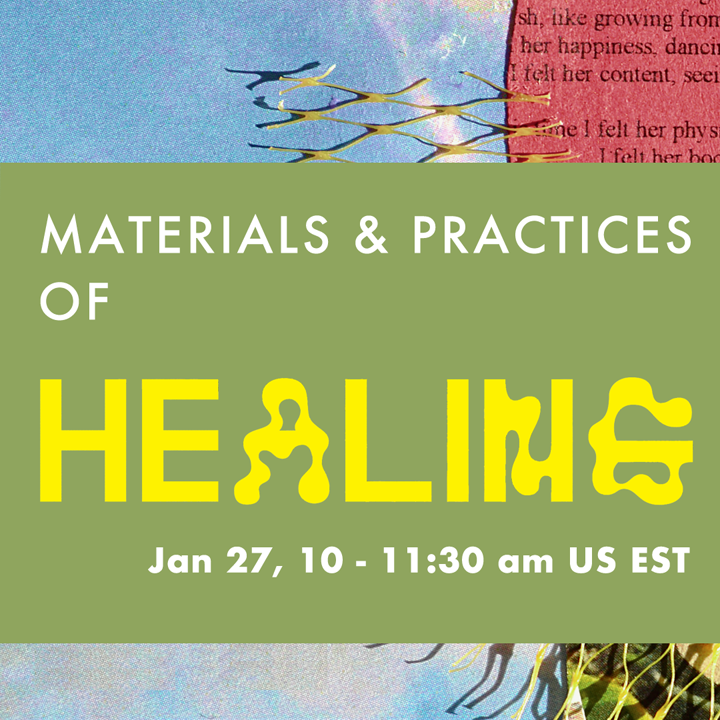- January 2026
- November 2024
- September 2024
- August 2024
- July 2024
- May 2024
- January 2024
- December 2023
- November 2023
- June 2023
- May 2023
- September 2022
- August 2022
- May 2022
- April 2022
- October 2021
- June 2021
- May 2021
- March 2021
- February 2021
- December 2020
- September 2020
- August 2020
- July 2020
- June 2020
- January 2020
- December 2019
- October 2019
- September 2019
- August 2019
- July 2019
Virtual Symposium, Oct 26, 2024, 1:30 PM IST (India)
Event Recording
Join us for this stimulating virtual symposium “Language Matters in Cultural Production”, on an aspect of knowledge that is vital to the way artifacts and images are understood. We will hear from Yuexiu Shen, Assistant Curator, Art Gallery of South Australia, Adelaide, Australia; Aditya Bayu Perdana, Lecturer, Interior Design, Faculty of Creative Industries, Telkom University, Bandung, Java, Indonesia; and Medha Bhatt, Textile Artist and Researcher, based in Vadodara, Gujarat, India. The event is timed for audiences from UK and Europe, South and South East Asia, and Australia. A recording of the event will be made available on this website, subsequently.
Language IS culture. What is at stake in the cultural production field when languages are translated into labels for museum displays, catalog notes for collections, and as communication/research media and sources? What is foregrounded-backgrounded or lost-gained in approaching an object, image, or sound, from one linguistic angle vis-à-vis another? Through 3 talks by a museum curator, typeface designer, and textile researcher this exploratory event emphasizes the importance of language as sensory perception, mediation, and meaning-making in the cultural production field.
Agenda (1:30 pm - 3:00 pm Indian Standard Time)
Introduction by Dr. Urmila Mohan, Founder, The Jugaad Project.
“Culture Loss in Chinese Language Use in Australian Galleries” by Yuexiu Shen.
“Mediating Heritage and Design in Traditional Indonesian Scripts” by Aditya Bayu Perdana.
“The Problem of 'Blanket' Terms in Studying Gujarati Textiles” by Medha Bhatt.
Q&A with audience members.
Virtual Book Discussion, Jan 19, 2024 10am US EST
Update: Recording of the Event.
Original Notice: Book discussion on ‘efficacious intimacy’, a framework for studying belief practices in religious and political domains. This volume was made through workshops organized by The Jugaad Project.
Join us for an exciting online book discussion on "The Efficacy of Intimacy and Belief in Worldmaking Practices". The study of how beliefs make and manifest power through their sociality and materiality can reveal who, or what, is considered effective in a particular socio-cultural context. The chapters feature case studies drawn from diverse religious and political contexts in Asia, Africa, and the Americas, and explore practices ranging from ingesting sacred water to resisting injustice. In doing so, the authors analyze emotions and affects, and how they influence dynamics of proximity and distance. Taking an innovative approach to the topic of intimacy, the book offers a fascinating examination of how life-worlds are constructed by material practices. It will be of interest to scholars of anthropology, religion, and material culture.
Virtual Symposium, Nov 18, 2022 9am US EST
Update: Recording of the Event.
Original Notice: In this Zoom Symposium, authors of our Fall ’22 Activism Issue share their reflections on processual aspects of activism both in their own lives as well as through the themes of their articles.
Activism relies heavily on the use of materials and bodies as modes of action and aesthetics to effect power and change. Depending on cultural ways of ‘doing’ and ‘making’, differing political, ethical, and moral states and values come to be assigned to activist practices. Determining the effects of these practices is, thus, a relational process. While keeping in mind socio-cultural specifics, this symposium will explore the connections between activist and artistic practice in the US, Thailand, and Indonesia via the research and work of Dr. Angela Beallor, Dr. Anissa Rahadiningtyas, Citra Sasmita, and Peera Songkünnatham. The techniques, actions, and materials, as well as the beliefs invoked in these varied instances will be related to both local and global horizons of possibilities.
Virtual Symposium,Jan 27, 2022 10am US EST
Update: Recording of the Event.
Original Notice: Please join us for a Zoom Symposium hosted by TJP where our editors will converse with the authors of our Fall ’21 Healing Issue as well as introduce our Spring ‘22 Issue on Craft.
Healing practices are often central to the study of religion. In certain contexts, religion—as essence, spirit, cosmology, belief—is specifically valued because of its potential for healing. What processes, movements, and epistemological or physical structures make productive spaces for healing? How can we think about healing to move via and past the physical, interrogating ways of being through time, place, and space? How can relationality, place-based thinking, and embodied ways of knowing come together to form a collective consciousness around healing when framed as well-being, care, mindfulness and gratitude?
Schedule of Talks
Cyndy Margarita Garcia-Weyandt (Assistant Professor, Department of Critical Ethnic Studies, Kalamazoo College, US, and Emily Levick (Doctoral Student, University of Leicester, UK)
Rose Wellman (Assistant Professor, Anthropology, University of Michigan-Dearborn) and Maheshvari Naidu (Professor, Social Anthropology, University of KwaZulu-Natal, South Africa)
Simashree Bora (Assistant Professor, Department of Sociology, Cotton University, Guwahati, India) and Debapriya Chakraborty (ESRC Postdoctoral Fellow, School of Environment, Education and Development, University of Manchester, UK)
Virtual Book Launch,Jan 12, 2021 10am US EST
Update: Recording of the Event.
Original Notice: Please join us for a Zoom Webinar hosted by TJP featuring the co-editors and authors of The Material Subject: Rethinking Subjects and Objects in Motion (Routledge, 2021).
The Material Subject emphasises how bodily and material cultures combine to make and transform subjects dynamically. The book is based on the French Matière à Penser (MaP) school of thought, which draws upon the ideas of Mauss, Schilder, Foucault and Bourdieu, among others, to enhance the anthropological study of embodiment, practices, techniques, materiality and power.





